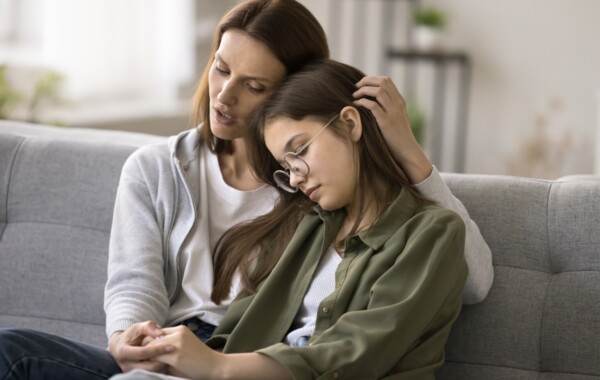PMS, or premenstrual syndrome, is a collection of physical and emotional symptoms that occur in the days leading up to a woman’s menstrual period. It is characterized by a variety of physical and emotional symptoms that can range from mild to severe.
PMS can be experienced by teens as well. At least 20% of teenagers experience moderate-to-severe premenstrual symptoms associated with functional impairment (1).
In this blog, we will explore the symptoms of PMS within the following categories: physical symptoms and emotional symptoms. It is important for parents to be aware of the signs and symptoms so they can provide support and help their daughter manage the condition.
Common symptoms of PMS in teens
The symptoms of PMS can be particularly distressing for teenage girls, as they can disrupt daily activities and have a negative impact on their quality of life. Below are the most common PMS symtoms experienced by girls.

Bloating and Water Retention: One of the most common physical symptoms of PMS in teen girls is bloating. Many girls experience bloating during their menstrual cycle, and it can be particularly pronounced in the days leading up to their period. This can cause discomfort and make clothing feel tight and uncomfortable. Girls may also notice puffiness in their face and hands.
Fatigue and tiredness: Fatigue and tiredness are also common physical symptoms of PMS in teenage girls. Many girls report feeling more tired and lethargic in the days leading up to their period. This can be particularly challenging for girls who are trying to balance school, sports, and other activities.

Headaches and migraines: these are also common physical symptoms of PMS in teen girls. The hormonal fluctuations that occur during the menstrual cycle can cause changes in blood flow and lead to headaches and migraines. These can be particularly debilitating for girls, as they can interfere with school, extracurricular activities, and social interactions.
Acne Breakouts: Acne is another physical symptom of PMS that can be particularly frustrating for teen girls. Hormonal changes during the menstrual cycle can cause an increase in oil production in the skin, which can lead to breakouts. This can be particularly distressing for girls especially those who may already be struggling with self-esteem and body image issues.
Breast tenderness and swelling: this is another physical symptom of PMS that can be particularly uncomfortable for teen girls. Hormonal changes during the menstrual cycle can cause breast tissue to swell and become tender, which can be painful and make it uncomfortable to participate in physical activities.
Menstrual cramps: Menstrual cramps, also known as dysmenorrhea, are a common symptom of PMS in girls. The pain can range from mild discomfort to severe pain that interferes with daily activities. Cramps occur as a result of the uterus contracting to shed its lining. The pain is often described as a dull or throbbing ache, and it can be felt in the lower abdomen, back, and thighs.

Cravings: During the premenstrual phase, many girls experience intense food cravings during PMS, especially for high-calorie, high-carbohydrate, fatty or salty foods like chocolate, sweets, chips and ice cream. While the exact cause of these cravings is not fully understood, it is believed to be related to changes in hormone levels during the menstrual cycle.
Anxiety: anxiety is one of the most common emotional symptoms experienced during PMS. Many girls may experience feelings of nervousness, uneasiness, or worry that may seem overwhelming. These feelings may be accompanied by physical symptoms such as rapid heartbeat, sweating, or shortness of breath.

Depression: this is another common emotional symptom experienced during PMS. It can manifest in feelings of sadness, hopelessness, or a loss of interest in activities that the person previously enjoyed. Irritability and mood swings are also common, and teen girls may become easily upset or angered by small things.
Sleep disturbances: Difficulty falling asleep, waking up during the night are common sleep-related symptoms of PMS in teens. This can be due to hormonal changes as well as stress, anxiety and other emotional symptoms that are associated with PMS. Getting enough sleep and practicing good sleep hygiene, such as avoiding caffeine and electronic devices before bedtime, can help reduce the impact of PMS on sleep.
What Can Parents Do?
It’s important to keep in mind that PMS symptoms can vary greatly from girl to girl, and some teens may experience only a few symptoms while others may experience many. Understanding the symptoms of PMS can help in their management and seek effective treatment when necessary.
There are several strategies that can help manage emotional symptoms during PMS. Engaging in regular exercise, getting adequate sleep, and maintaining a healthy diet can help alleviate symptoms. Additionally, stress reduction techniques such as meditation, deep breathing, or yoga can also help reduce emotional symptoms.
In some cases, medication or supplements may be prescribed to manage emotional symptoms. However, it is essential to discuss any treatment options with a healthcare provider, as some medications may not be appropriate for everyone.







